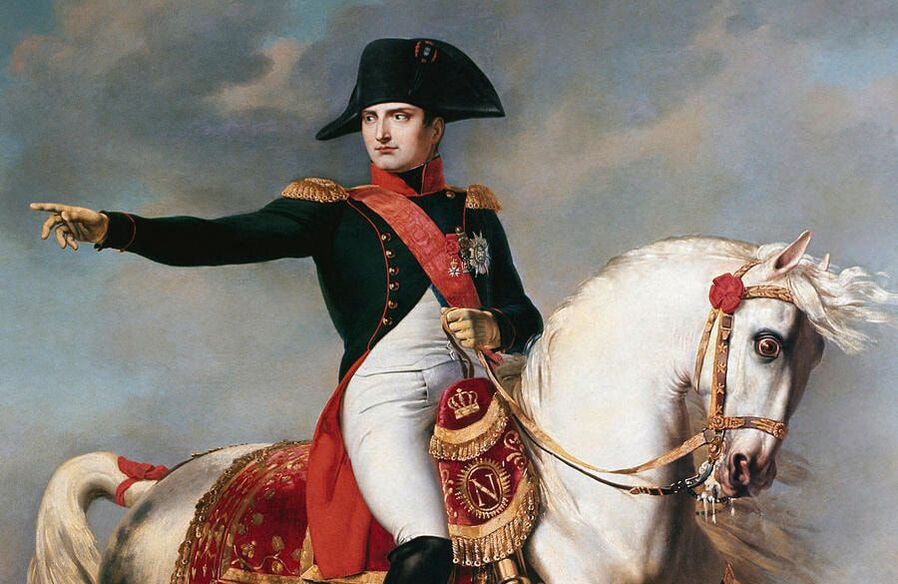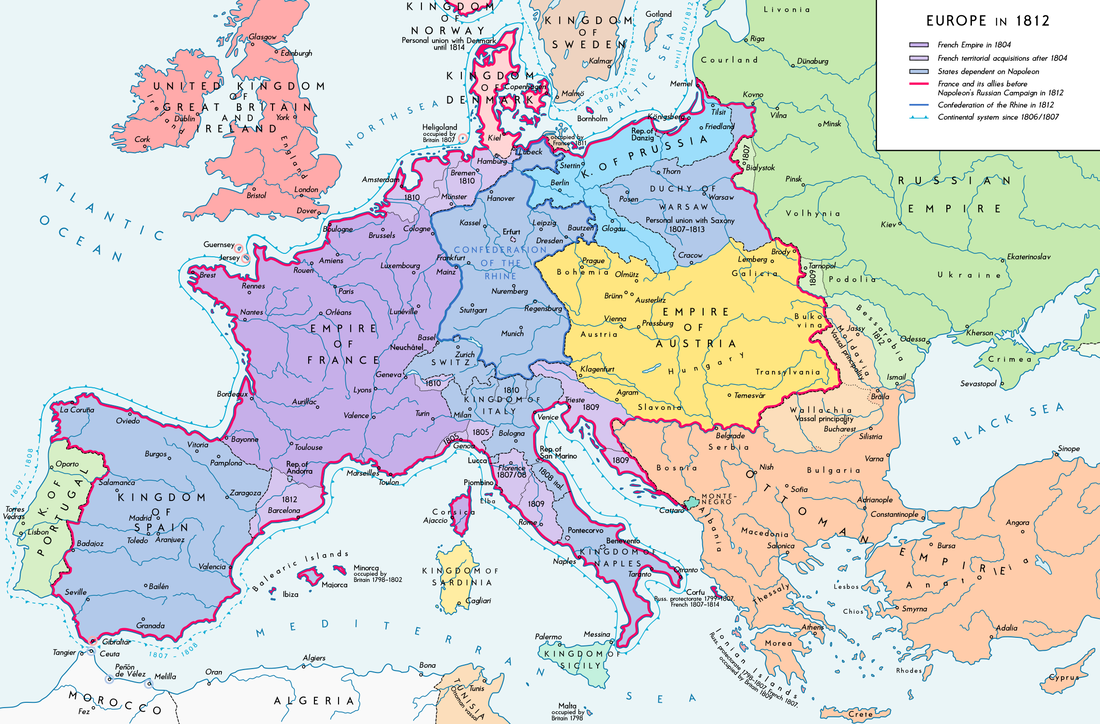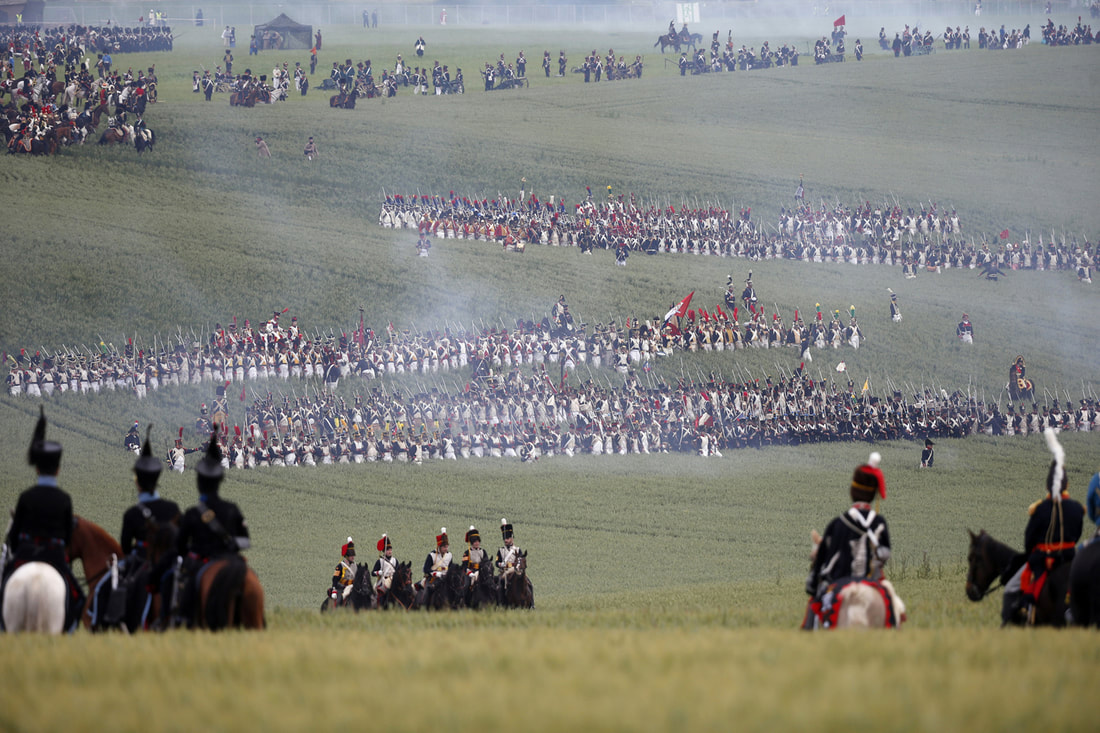The Napoleonic Wars
The French Revolution and Napoleonic Wars which followed it are two of the most important events in world history and marked the birth of modern Europe. The events from 1789-1815 went on to shape politics, society, religion and ideas about citizenship and freedom that continue to resonate to the present day. It is in this central event in world history that we take ourselves back: to Napoleon's France.
Napoleon
Napoleon Bonaparte rose from obscurity to become one of the greatest leaders in history. The events of the French Revolution in 1789 enabled Napoleon to advance rapidly through the army of the new French Republic. His military talents enabled him to rise to become the nations greatest general and was then able to use this influence to have himself made Emperor of France in 1804. During this period France was locked in a series of wars with the other great powers of Europe, Britain, Russia, Prussian and Austria all fought to halt the ambitions of Napoleon. Eventually the combined force of these powers defeated Napoleon and brought an end to the Napoleonic era, with the final battle being fought at Waterloo in 1815.
Napoleon Bonaparte rose from obscurity to become one of the greatest leaders in history. The events of the French Revolution in 1789 enabled Napoleon to advance rapidly through the army of the new French Republic. His military talents enabled him to rise to become the nations greatest general and was then able to use this influence to have himself made Emperor of France in 1804. During this period France was locked in a series of wars with the other great powers of Europe, Britain, Russia, Prussian and Austria all fought to halt the ambitions of Napoleon. Eventually the combined force of these powers defeated Napoleon and brought an end to the Napoleonic era, with the final battle being fought at Waterloo in 1815.
The Peninsular War
Many of the battles recreated in the UK are from the Peninsular War, fought between 1807 and 1814. As Napoleon's power grew he sought to incorporate the Spain and Portugal into the French Empire by placing his brother Joseph on the throne of Spain. Despite initial French successes against the armies of Spain and Portugal the peoples of these countries rose up against the French in a lengthy and brutal guerrilla war that would drag on for seven years draining French manpower and resources.
This war also saw the intervention of the British army that would work with the Portuguese and Spanish armies to drive the French from Spain. The British army under the Duke of Wellington was able to inflict a series of defeats on the French that broke their ability to hold onto Spain and pushed Napoleon's forces back into France in 1814. The war finally ended with Napoleon's abdication and exile in April 1814. The Peninsular War also features heavily in the Sharpe novels of Bernard Cornwell and the TV series Sharpe made during the 1990s.
Many of the battles recreated in the UK are from the Peninsular War, fought between 1807 and 1814. As Napoleon's power grew he sought to incorporate the Spain and Portugal into the French Empire by placing his brother Joseph on the throne of Spain. Despite initial French successes against the armies of Spain and Portugal the peoples of these countries rose up against the French in a lengthy and brutal guerrilla war that would drag on for seven years draining French manpower and resources.
This war also saw the intervention of the British army that would work with the Portuguese and Spanish armies to drive the French from Spain. The British army under the Duke of Wellington was able to inflict a series of defeats on the French that broke their ability to hold onto Spain and pushed Napoleon's forces back into France in 1814. The war finally ended with Napoleon's abdication and exile in April 1814. The Peninsular War also features heavily in the Sharpe novels of Bernard Cornwell and the TV series Sharpe made during the 1990s.
Waterloo
After Napoleon's exile in April he made a dramatic return to France in March 1815 starting what would become known as the Hundred Days campaign. Napoleon was able to escape from his exile and as he marched on Paris units of the French army who had been sent to stop in him, actually joined him and he was once again able to take control of France. The great powers of Europe did not want to see the return of Napoleon so they formed a coalition to put an end to Napoleon's ambition forever. From 15th June to the 18th June the armies of Napoleon clashed with the Anglo-Allied army under Wellington and the Prussian army under Prince Blucher in four battles. This ended with the Battle of Waterloo on 18th June 1815 which resulted in a crushing defeat for Napoleon and led to his final exile.
After Napoleon's exile in April he made a dramatic return to France in March 1815 starting what would become known as the Hundred Days campaign. Napoleon was able to escape from his exile and as he marched on Paris units of the French army who had been sent to stop in him, actually joined him and he was once again able to take control of France. The great powers of Europe did not want to see the return of Napoleon so they formed a coalition to put an end to Napoleon's ambition forever. From 15th June to the 18th June the armies of Napoleon clashed with the Anglo-Allied army under Wellington and the Prussian army under Prince Blucher in four battles. This ended with the Battle of Waterloo on 18th June 1815 which resulted in a crushing defeat for Napoleon and led to his final exile.




